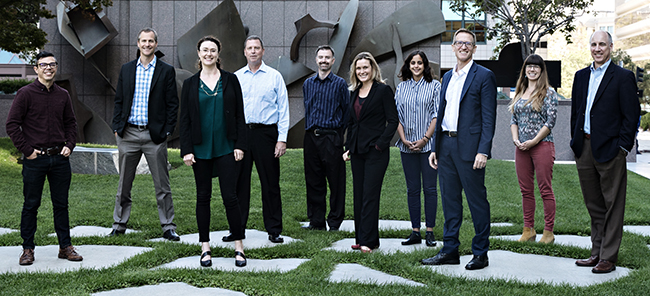Meet OP: Energy and Sustainability

E&S staff (from left): Nicholas Balistreri, Eric Eberhardt, Cynthia Clark, Robert Stanton, Matthew St.Clair, Hilary Bekmann, Kiara Hermann, David Phillips, Janika McFeely, and Mark Byron
What do you think of when someone says “sustainability”? The images that come to mind may involve cleaning up public places, using green products or separating recyclables from trash. While these actions are all important, creating a sustainable environment in a large institution like UC involves much more.
“Sustainability is like a three-legged stool,” said Director Matthew St. Clair of UCOP’s Energy and Sustainability (E&S) department. “The key is to balance environmental, economic and social issues, and each one is as important as the other two. For instance, if something makes economic sense and solves an environmental problem but doesn’t pay attention to social issues, the stool will fall over.”
Part of the Chief Operating Officer division, and managed by Assistant Vice President David Phillips, E&S leads UC’s systemwide efforts to make efficient, environmentally conscious use of university resources, including charting a path to carbon neutrality.
Far from being merely theoretical, this is a hands-on job that now includes running the electricity company that supplies power to UCOP’s Franklin building and several of the UC campuses.
“This gives UC the ability to choose where we get our power, making it easier for UC to adopt cleaner energy,” said Phillips. A recent example is the massive 660-acre solar panel project started last year in the Central Valley, which is the largest solar project initiated by an American university.
E&S works in partnership with all 10 UC campuses, which send representatives to the power program’s governing board. Recently the board voted unanimously for “Green in ‘17,” an initiative to establish creative contracts for low-carbon energy. As a result, “the electricity now provided to the campuses and the Franklin building is cleaner than nearly every other power supply in the state,” said Phillips.
On the path to carbon neutrality
The department spearheads the Carbon Neutrality Initiative (CNI) announced by President Napolitano in 2013. “The initiative, which pledges UC to become carbon neutral by 2025, is currently a central focus,” says Phillips of their 12-member department.
UC would be the first major university to accomplish the ambitious goal to completely eliminate or mitigate the greenhouse gas emissions from buildings and fleets of vehicles. Beyond solar and wind power, UC also has projects in development to substitute carbon-neutral biogas (aka biomethane) for UC’s large natural gas use.
CNI builds on existing efforts to reduce UC’s environmental impact and improve operations. E&S is responsible for supporting and tracking implementation of the systemwide Sustainable Practices Policy, which sets aggressive, but feasible goals in nine categories of business practices, including transportation, waste management, procurement, food, and water. Thanks to these policies and UCOP support, the campuses have implemented over 1,000 energy efficiency projects, cutting utility costs by over $200 million to date.
UC also now has more LEED green building certifications than any other university. In fact, UCOP’s Franklin building holds the honor of being the first office building in the city of Oakland to achieve LEED certification for its ongoing operations and maintenance.
Leaving its mark beyond UC
The department’s impact reaches far beyond UC. In 2015, E&S helped convene a research summit with Gov. Jerry Brown, the United Nations, and the U.S. Department of Energy, and unveiled a report, “Bending the Curve,” which details the top 10 scalable solutions to combat climate change. Written by over 50 UC faculty and staff members from multiple disciplines across all 10 campuses, the report influenced the Paris Agreement reached at the Paris Climate Summit two months later, said St. Clair.
What you can do to be more sustainable
In the face of such large initiatives, we asked the E&S staff what we as UC employees can do on a daily basis to make our offices more sustainable. Their suggestions included making sure our events create zero waste. This means reducing or eliminating food packaging and paper handouts and making sure that any non-reusable dishware and packaging is recyclable or compostable so that zero waste is sent to the landfill.
If you’re interested in learning more about how to make your departmental operations or events more sustainable, you can contact E&S for helpful tips by emailing sustainability@ucop.edu.
Reporting for this profile was provided by Cindy Lau. The “Meet OP” series of department profiles was created in response to your requests. You can see all previous articles in the series by clicking here.
If you have suggestions for this series, please email link@ucop.edu. If you have comments about this particular article, we invite you to post them in the box below.


